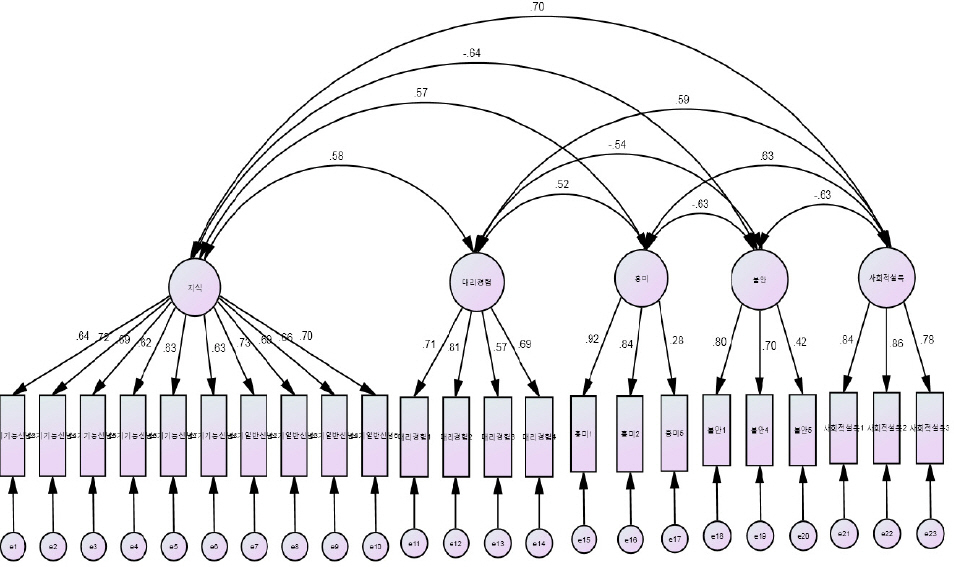김혜경(2018). “자유글쓰기(Free-Writing)를 활용한 글쓰기 동기부여 전략”, 인문학연구 57(2), 187-210.
나은미(2014). “대학 신입생의 글쓰기 능력에 대한 학생 자신의 인식 분석- 한성대학교 2014년 신입생을 대상으로”, 한성어문학 33, 29-59.
박영민, 김승희(2007). “쓰기 효능감 및 성별 차이가 중학생의 쓰기 수행에 미치는 효과”, 국어교육학연구 28, 327-359.
배상훈, 윤유진(2012). “대학생의 글쓰기에 대한 태도 및 인식이 글쓰기 자기 효능감에 미치는 영향 분석”, 한국HRD연구 7(3), 1-19.
이재승(2011). “글쓰기 효능감 연구의 동향”, 한국초등국어교육 46, 245-267.
우종필(2012). 구조방정식모델 개념과 이해: Amos 4.0~20.0 공용, 서울: 한나래.
장봉기, 김영란(2014). “외국 검사도구의 번역 및 타당화 과정에 대한 비판적 검토-국어과 정의적 영역의 검사도구를 중심으로”, 국어교육학연구 49(1), 558-584.
정혜경(2018). “쓰기 효능감을 활용한 대학 글쓰기 교육의 실제”, 우리문학연구 60, 413-448.
지현배(2011). “글쓰기 효능감을 고려한 첨삭 지도 전략”, 리터러시연구 3, 157-181.
탁진국(2007). 심리검사 개발과 평가방법의 이해, 서울: 학지사.
Bandura, A(1986). “The explanatory and predictive scope of self-efficacy theory”,
Journal of Social and Clinical Psychology 4(3), 359-373.

Bandura, A(1993). “Perceived self-efficacy in cognitive development and functioning”,
Educational Psychologist 28(2), 117-148.

Bandura, A(1997). “The anatomy of stages of change”,
American Journal of Health Promotion:AJHP 12(1), 8-10.


Bush, G, Jones, J. L(2010). Exploration to Identify Professional Dispositions of School Librarians:A Delphi Study, School Library Media Research 13.
Graham, S, Harris, K. R(1989). “Components analysis of cognitive strategy instruction:Effects on learning disabled students'compositions and self-efficacy”,
Journal of Educational Psychology 81(3), 353-361.

Kaiser, H. F(1974). “An index of factorial simplicity”,
Psychometrika 39(1), 31-36.

Lawshe, C. H(1975). “A quantitative approach to content validity 1”,
Personnel Psychology 28(4), 563-575.

Meyer, K(1992). “Variance components due to direct and maternal effects for growth traits of Australian beef cattle”,
Livestock Production Science 31(3-4), 179-204.

Murry, J. W Jr, Hammons, J. O(1995). “Delphi:A versatile methodology for conducting qualitative research”,
The Review of Higher Education 18(4), 423-436.

Pajares, F(2003). “Self-efficacy beliefs, motivation, and achievement in writing A review of the literature”,
Reading &Writing Quarterly 19:139-158.

Pajares, F, Hartley, J, Valiante, G(2001). “Response format in writing self-efficacy assessment:Greater discrimination increases prediction”,
Measurement and Evaluation in Counseling and Development 33(4), 214-221.

Pajares, F, Valiante, G(1999). “Influence of self-efficacy on elementary students'writing”,
The Journal of Educational Research 90:353-360.

Rosenthal, R(1978). “Combining results of independent studies”,
Psychological Bulletin 85(1), 185-193.

Schunk, D. H, Swartz, C. W(1993). “Writing strategy instruction with gifted students:Effects of goals and feedback on self-efficacy and skills”,
Roeper Review 15(4), 225-230.

Shell, D. F, Murphy, C. C, Bruning, R. H(1989). “Self-Efficacy and Outcome Expectancy Mechanisms in Reading and Writing Achievement”,
Journal of Educational Psychology 81(1), 91-100.

Tabachnick, B. G, Fidell, L. S(1989). Using multivariale statistics, 2nd ed. Cambridge: Harper &Row.
Zimmerman, B. J, Bandura, A(1994). “Impact of self-regulatory influences on writing course attainment”,
American Educational Research Journal 31(4), 845-862.










